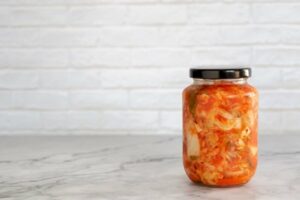By David Saunders | UPDATED: 11:28, 12 March 2020
The recent outbreak of the Covid-19 coronavirus has shown us just how vulnerable we are to the emergence of new infectious diseases.
The spread of novel viruses is a particular problem because we can’t rely on medicines to help us fight them.
GP and co-creator of The Fast 800, Dr Clare Bailey
Our best defence is a fully active immune system. Your immune system is a complex army of cells which are there to identify and destroy any potentially dangerous invaders. But to do this effectively the army needs to be in the best possible condition for combat.
You might be surprised to learn that women have stronger immune systems than men, which might explain why men have a 50% higher risk of contracting the corona virus (and may explain ‘man flu’!)
The problem is that as we get older our immune system tends to get weaker and less effective. So, what can you do to keep yours in good shape and ready to take on all comers? These are my top recommendations:
-
Eat to Beat Infection – one of the best ways to boost your immune system is by eating a low-ish carb, Mediterranean-style diet. This is widely seen as the healthiest, most nutrient rich diet on the planet, containing lots of vegetables, fruit, whole grains, lentils beans, nuts, seeds, spices and olive oil, as well as some oily fish, cheese and full fat yoghurt.
Not only is the Mediterranean diet high in health promoting nutrients, but the high fibre content is a great way to boost your microbiome, the trillions of microbes that live in your large intestine and which are so important for your health.
What the “good” microbes do is convert the fibre that you eat into health promoting substances called Short Chain Fatty Acids (SCFAs).
SCFAs are great at reducing inflammation and play a significant part in maintaining a healthy immune system. Other foods which are beneficial for your microbiome include fermented foods such as sauerkraut and kimchi, live yoghurt, cheese, sourdough bread.
These probiotic rich foods are also rich in vitamin c, iron and zinc, which are known to boost the immune system. You can also get probiotics from the chemist (choose the ones with both a high number and variety of bacteria). Green tea, mushrooms, garlic and vitamin C containing foods like citrus fruits are also beneficial.
So, treat your microbiome with care; feed it well and it will look after you. Eating loads of sugary or processed foods, on the other hand, will just reinforce the “bad” microbes that also live down there. Try one of our gut friendly recipes from The Fast 800 – www.thefast800.com
Mild Kimchi-style Sauerkraut from The Fast 800
Otherwise known as Asian sauerkraut, Kimchi is a spicy, exotic, strongly flavoured fermented vegetable dish popular in Korean cuisine. This recipe is a milder version. Calories: 220 (whole recipe)
Ingredients
· ½ medium white cabbage, quartered lengthwise, hard core removed, sliced into 1½-2cm ribbons
· 1½ red onions, halved and sliced
· ½ tbsp sea salt or kosher salt
· 2 tsp garlic, grated
· 1 tsp ginger, grated
· 1 tsp sugar
· 1 tbsp fish sauce or soy sauce
· 2-4 tsp chilli flakes, according to taste
· 1 tsp paprika
· 2 x 250ml clean jam jars with tight-fitting lids
Method
1. Mix the cabbage with the onion in a large bowl, sprinkling the salt between the layers as you fill it. Massage the salt into the veg. Leave it for about 2 hours.
2. Stir in the garlic and ginger and mix well.
3. Spoon the cabbage mixture and the juices into jars.
4. Pack the mixture down in the jars, pressing it into the mixture. Leave 1.5-2cm space at the top. If there is not enough liquid to cover the mixture you can top up either with a few teaspoonfuls of filtered water or brine (made with 1 tsp sea salt dissolved in 200ml filtered water).
5. You can use a stone or piece of ceramic to keep the veg submerged. Place the sealed jars on a plate to catch any overflow. Keep them at room temperature, out of direct sunlight. For the first few days, open the jars daily and press down the contents, to release the bubbles formed by the sauerkraut.
6. After 3-4 days, gently mix in the rest of the ingredients (the cabbage doesn’t ferment so effectively with the spices, so these can be added a bit later in the process).
7. Then repeat this process every few days for 1-2 weeks (usually about 1 week will do) until it is fermented to your taste.
8. Then store the jars in the fridge for 2-3 months.
-
Maintain a healthy weight. Being overweight can weaken your body’s immune system and reduce its ability to fight off infections
-
Keep your blood sugars in the normal range, People who have prediabetes (raised blood sugar levels) or diabetes are much more vulnerable to infections
-
Manage Stress; an increase in the stress hormone, cortisol, reduces your ability to fight infections
-
Get more good quality sleep; a range of infection-fighting chemicals are released when you are in deep sleep.
-
Being active will promote good blood circulation, which means the cells of your immune system can travel freely round your body and do their job efficiently.
-
Supplement with immunity boosting vitamins and minerals, such as a moderate dose of Vitamin D (depleted at this time of year) and consider vitamin E (in almonds, seeds and spinach) and B6 known as pyridoxine (in milk, dairy, chicken, fish, carrots, spinach) and the mineral zinc (plenty found in a med-style diet) which may reduce cold viruses by 50%.
-
Follow sensible advice to maintain good hydration, limit alcohol intake, ensure you are getting adequate protein and iron, and avoid smoking as your lungs can show a rapid recovery even within a few weeks to reduce risk of pneumonia.
A 12-week programme on thefast800.com costs £99 and includes:
-
Personalised menus: 800 calories per day, 5:2, or a Mediterranean-style plan, all with vegetarian options. Your online personal assessment will determine the right plan for you (however, you can change your menu preferences at any time throughout the programme).
-
A meal planner: swap recipes in and out, as it suits.
-
Shopping lists that update when you change your meal plan.
-
Nearly 250 easy-to-make and ‘taste great’ recipes.
-
Exercise plans for the novice, confident and expert!
-
Mindfulness guidance.
-
A personal tracker.
-
All-new handouts and a library of videos to support learning.
-
An active forum of like-minded colleagues and dedicated health professionals.
If you like the sound of this recipe you need to head over to www.thefast800.com for further great information.






